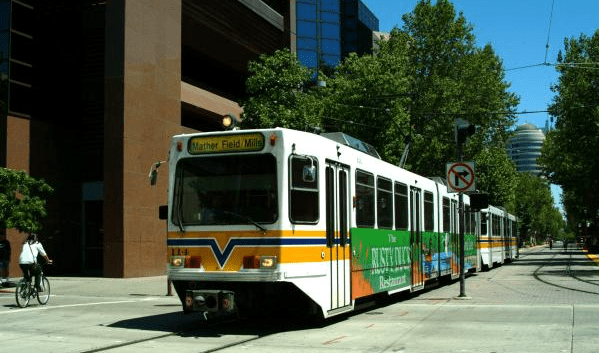
(Ryan Wiggins is Transportation for America’s an on the ground in Southern California. Last week he presented a primer on transportation funding at “Expanding Our Public Transit Options: Resources to Keep LA Moving Forward?” a Salon put on by Breathe L.A. He was nice enough to share his notes with us in a two-part series. Today we’ll focus on some legislation moving in Sacramento. Yesterday Wiggins gave an overview of the federal picture. – DN)
Earlier this year, the State of California reenacted the state fuel tax which is viewed by T4A partners as a positive development. This maintains transit funds at $330 million – meaning that there have been no more cuts proposed this year; however, if the state budget process fails i.e. the revenue mechanisms/taxes proposed by Governor Brown are not enacted then cuts to state transit funds could once again be on the table
Transportation for America doesn’t take positions on state and local issues; however, partners such as Transform are taking a leadership role on state transit issues with the goal of making California’s public transportation networks more expansive and efficient.
There are several bills being proposed this year in the state legislature but two that have the possibility of increasing ridership, access to transit, and overall farebox recovery.
SB 582, Commuter Benefits Support, was introduced by Senator Bill Emerson (R-Riverside). This legislation requires Municipal Planning Orgamizations (MPOs ) such as the Southern California Association of Governments to work with Air Districts to require companies with more than 20 employees to:
- Provide a pre-tax benefit to both employers and employees; or,
- Provide a transit subsidy; or,
- Employer provided shuttle service
There is a similar federal benefit that was extended in December for one year as part of the tax cut package. It saves both the company (as much as $1230) and the employee (as much as $500) tax money each year. The state pre-tax benefit would provide this same type of win-win benefit for the employers and employees. Any of the three would increase ridership, farebox recovery, and help reduce VMT, fuel usage, congestion, air pollution, and GHGs while making transit systems more sustainable
AB 147, the Subdivison Map Act, was introduced by Roger Dickinson (D-Sacramento). This legislation authorizes cities and counties to charge developer fees to defray the costs of transportation improvements, but it is currently limited to bridges and throughfares. In many areas this cannot be done due without tearing down existing homes and businesses, and where it can be done may not be desirable.
- This bill expands the use of these fees for transit, walking, and bicycling facilities
- Can increase the access of populations to transit, increasing ridership, reducing VMT, increasing farebox recovery
- Support SB 375 implementation goal
T4A does not have a position on these bills but its partners such as Transform are advocating for them as a means of improving California’s transit systems. Transform and CalTransit Association are pushing these bills and were in Sacramento last week for an advocacy day focused on them. More information on these bills can be found at http://investintransit.org/.
Streetsblog will keep its eye on this legislation as it moves forward.





